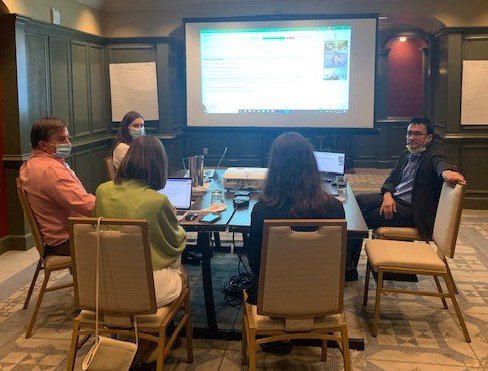RPPN convenes for two-day strategy meeting
- Published October 29, 2021

From Oct. 17-19, members of the Center for Pediatric Everyday Readiness-Regional Pediatric Pandemic Network (RPPN)—a new network that aims to prepare the nation to be ready to care for children in disasters and everyday emergencies—gathered in-person and virtually to connect across regions and areas of expertise to map out network plans and activities. The meeting culminated in a presentation to representatives from the Health Resources and Services Administration (HRSA) during which the RPPN team outlined its work to date.
The RPPN is a five-year, $48 million grant from HRSA that was awarded Sept. 1 to five children’s hospitals: University Hospitals Rainbow Babies and Children’s Hospital (the lead center); University of California San Francisco-Benioff Children’s Hospital; University of Louisville School of Medicine-Norton Children’s Hospital; University of Utah, Primary Children’s; and Saint Louis University-Cardinal Glennon Children’s Hospital.
The network brings together the expertise of these hospitals with the work of the HRSA-funded EMSC Innovation and Improvement Center (EIIC) and two Pediatric Disaster Care Centers of Excellence, which are funded through the Office of the Assistant Secretary for Preparedness and Response (ASPR): the Western Regional Alliance for Pediatric Emergency Management (WRAP-EM) and the Eastern Great Lakes Pediatric Consortium for Disaster Response (EGLPDR).
“The children’s hospitals, each representing distinct regions of the country, are the implementation arm of the RPPN,” says Charles Macias, MD, MPH, Co-Principal Investigator of the RPPN, Co-Director of the EIIC, and Chief Quality Officer at Rainbow Babies and Children's. “Their efforts will build off of the collaboration and experience of existing networks—the EIIC and ASPR Pediatric Disaster Care Centers of Excellence—to launch the RPPN, integrate necessary community resources, and sustain its success.”
In particular, the RPPN will emphasize and draw on the link between improving everyday pediatric readiness, a flagship initiative of the EMSC program, and improving pediatric disaster preparedness.
The RPPN’s four strategic goals are:
- Expand the scope and number of collaborations and partnerships of children’s hospitals with systems of preparedness.
- Improve pediatric readiness across health systems influenced by children’s hospitals.
- Increase the capacity and capability of telehealth to address children’s unique needs during a disaster or global health threat.
- Accelerate the real-time dissemination and uptake of research-informed pediatric care to address the needs of children and their families.
“The strategy meeting was a pivotal step forward in coming together across organizations and aligning around our shared goals as a network,” adds Co-Principal Investigator Christopher Newton, MD, FACS, FAAP, Medical Director of the Trauma Care Center and Pediatric Surgery Department at Benioff Children's. “We are incredibly grateful to have such a passionate, engaged team of experts across disciplines and across the country.”

Approximately 16 RPPN team members gathered in-person in Austin, TX, while nearly 45 joined in the meeting virtually. The group broke into teams to tackle various topics, including beginning to identify and refine core values; mission and vision statements; primary areas of focus; and potential collaborators and advisors. The team also divided up into its four major components—the five children’s hospitals; the EIIC; and the two ASPR Pediatric Disaster Care Centers of Excellence as the third and fourth groups—to conduct and present SWOT (strengths, weaknesses, opportunities, and threats) analyses.
A foundational component of the meeting was the presentation and discussion of each domain’s long-term goals and what they deemed as their most important activity over the next six to nine months. Domains within the RPPN include: analytics, regionalization/equity, health information portability, mental/behavioral health, research, quality improvement collaboratives, pediatric readiness, surge capacity, trauma/burns, drill and exercises, deployable assets, infectious diseases, chemical, biological, radiological and nuclear defense, legal, telehealth, community/medical home, reunification, prehospital, knowledge/education.
Slides recapping the meeting, which were presented to HRSA, can be viewed here. The RPPN will hold an official kick-off meeting on Nov. 19.